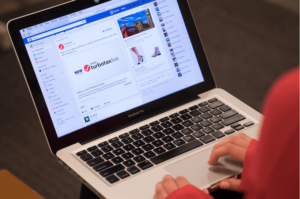by The Cowl Editor on March 1, 2018
Editorials

by Kelsey Dass ’18
Opinion Staff
For most of history, our society lacked resources to easily access information. From finding another person’s number in the phonebook to conducting research on a distinct disease, it was a tedious challenge.
Our advancements in technology have allowed for the internet to be an incredible resource for quick and detailed information. However, the growing access to information has called an end to privacy. Privacy is one of our most valuable rights and giving it up is extremely dangerous.
As college students, the internet has become our best friend, both academically and socially. Every student at Providence College has had to write a research paper. If you are reading this and thinking, “I never had to do that,” it is most likely because it was so gruesome you blocked it out of your memory.
Writing the research paper took hours; however, accessing the articles and peer-reviewed journals took all of three seconds. Before this immediate access, college students used to sit in the library for days, sifting through endless shelves of books, articles, and old newspapers.
From an academic standpoint, the access to information has changed the approach to learning and has allowed college students to go further and study more deeply in multiple content areas.
All of us at PC were born on the cusp of the iGeneration. This means we have grown up using the internet, through both computers and cell phones and we comfortably interact with social media.
Social media is our favorite tool, whether it be Snapchat, Instagram, Twitter, or Facebook, most kids that make up iGen are constantly scrolling. While we scroll to like, comment, tag, and share our favorite pictures, videos, and memes, we blindly sell our interests on the internet.
The New York Times writers Andrew Burt and Dan Geer bring light to this pressing issue. On May 23, 2017, “Google announced that it would begin to tie billions of credit card transactions to the online behavior of its users, which it already tracks with data from Google-owned applications like YouTube, Gmail, Google Maps, and more. Doing so allows it to show evidence to advertisers that its online ads lead users to make purchases in brick-and-mortar stores.”
The minute you enter a search on Google, watch a video, and even head to a certain area using maps, the Internet chips away at your personal privacy and information. For example, the minute you search Vineyard Vines on the Internet and then check Instagram just a minute later, Vineyard Vines comes up as an advertisement on your feed.
The advertisements are so camouflaged that we simply do not recognize the slow loss of our privacy and personal information. Our generation has grown up in a world where we use the internet constantly; we are not in the process of learning how to use it, it is already ingrained in our daily lives.
As students become more aware of this issue, controversy arises. Finance major Christian Giacondino ’18 discussd his concerns, “The changing environment in terms of connectivity is a huge step for individuals, as well as businesses and certain organizations that benefit from receiving speedy information. However, I do believe the average American consumer is being preyed upon by some social media outlets by taking our internet search data for example, and further projecting Facebook ads on what we may have previously searched. What I find concerning is a lot of us do not realize how little privacy we actually have on the internet.”
Our privacy is officially dead, with no help from the government. Google and other technological sources have full access to not only what we search, but what we say. Social Work major Morgan Itz ’18 notes this issue, “Just the other day I talked about wanting new leggings from Lululemon, the following day my Instagram feed flooded with Lululemon advertisements.”
Our words and actions are out of our hands and into the hands of technology. The question is, can we ever get it back?